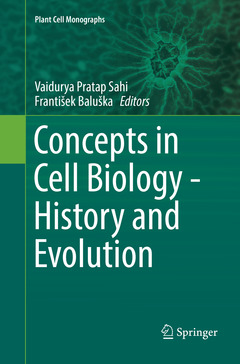Description
Concepts in Cell Biology - History and Evolution, Softcover reprint of the original 1st ed. 2018
Plant Cell Monographs Series, Vol. 23
Coordinators: Sahi Vaidurya Pratap, Baluška František
Language: English
Subjects for Concepts in Cell Biology - History and Evolution:
Concepts in Cell Biology - History and Evolution
Publication date: 01-2019
Support: Print on demand
Publication date: 01-2019
Support: Print on demand
Concepts in Cell Biology - History and Evolution
Publication date: 03-2018
Support: Print on demand
Publication date: 03-2018
Support: Print on demand
Description
/li>Biography
/li>Comment
/li>
This book discusses central concepts and theories in cell biology from the ancient past to the 21st century, based on the premise that understanding the works of scientists like Hooke, Hofmeister, Caspary, Strasburger, Sachs, Schleiden, Schwann, Mendel, Nemec, McClintock, etc. in the context of the latest advances in plant cell biology will help provide valuable new insights.
Plants have been an object of study since the roots of the Greek, Chinese and Indian cultures. Since the term ?cell? was first coined by Robert Hooke, 350 years ago in Micrographia, the study of plant cell biology has moved ahead at a tremendous pace. The field of cell biology owes its genesis to physics, which through microscopy has been a vital source for piquing scientists? interest in the biology of the cell. Today, with the technical advances we have made in the field of optics, it is even possible to observe life on a nanoscale. From Hooke?s observations of cells and his inadvertent discovery of the cell wall, we have since moved forward to engineering plants with modified cell walls. Studies on the chloroplast have also gone from Julius von Sachs? experiments with chloroplast, to using chloroplast engineering to deliver higher crop yields. Similarly, advances in fluorescent microscopy have made it far easier to observe organelles like chloroplast (once studied by Sachs) or actin (observed by Bohumil Nemec). If physics in the form of cell biology has been responsible for one half of this historical development, biochemistry has surely been the other.
Vaidurya Pratap Sahi is a researcher at the Molecular Cell Biology Laboratory, Botanical Institute, Karlsruhe Institute of Technology, Germany. He completed his BSc in Agricultural Sciences at Sam Higginbotton University of Agriculture, Technology and Sciences, India, followed by an MSc in Plant Breeding and Genetics at Tamil Nadu Agricultural University, India. Supported by a Monbukagakusho fellowship (MEXT), he completed his PhD in Molecular Biology at Ehime University, Japan in 2012. Presently he is working in the field of plant cell biology to understand the role of actin and microtubules in the development of rice plants. His interests include Plant Signaling, Plant Intelligence, Utilization of Landraces of Crops and History of Plant Biology. He is a member of the editorial team of the journal Plant Signaling & Behaviour. He also serves as an ambassador for the Society of Experimental Biology, UK.
František Baluška is a lecturer and researcher at the Institute of Cellular and Molecular Botany at Bonn University, Germany. He obtained the Full Professor title at the Comenius University Bratislava (Slovakia) in 2008. His main interest is plant cell biology, especially root apices, as related to the cytoskeleton, endocytosis, vesicle trafficking and polarity. He has investigated root apices for more than twenty years, and made original contribution to the root apex organization by the discovery of a transition zone interpolated between the apical meristem and the rapid cell elongation region. František Baluška is also interested in the response of roots to environmental factors such as gravity, as well as in the emerging field of plant neurobiology. Finally, he is interested in the conceptual analysis of the cell theory. He published more than eighty research papers and edited several books. In 2005, he initiated the Plant Neurobiology Society which annualy organizes international symposia on plant neurobiology. František
Discusses concepts and theories in cell biology from ancient times to the 21st century
Puts the work of famous scientists like Hooke, Hofmeister, Sachs, Schwann, Mendel, Nemec, and McClintock into today’s perspective
Written by leading experts in the field
© 2024 LAVOISIER S.A.S.




